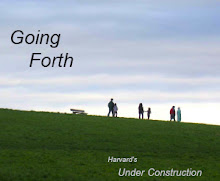It’s been more than three days since I first read about Aliza Shvarts – the Yale senior who claims to have artificially inseminated herself “as often as possible” during the past year and then taken abortifacient drugs to induce miscarriages as part of her senior art project – and I’m still trying to wrap my mind around it. I will provide a brief run-down of the situation for those who may not have heard about this yet.
On Thursday morning, the
Yale Daily News ran a
story about Shvarts’s project entitled “For senior, abortion a medium for art, political discourse.” The Drudge Report and other news outlets picked up the story, and it quickly permeated the Internet. Later in the day, a Yale spokeswoman released a
statement saying that Shvarts had informed Yale officials that she had never actually impregnated herself, that the whole thing was just “performance art.” Shvarts
shot back that the Yale administration was simply trying to dissociate itself from her in response to negative media attention, and that she really had repeatedly inseminated herself and self-aborted as she claimed. On Friday, the
Yale Daily News ran a
column by Shvarts in which she explained what she considered the artistic significance of her project and gave this account of how she had proceeded:
“For the past year, I performed repeated self-induced miscarriages. I created a group of fabricators from volunteers who submitted to periodic STD screenings and agreed to their complete and permanent anonymity. From the 9th to the 15th day of my menstrual cycle, the fabricators would provide me with sperm samples, which I used to privately self-inseminate. Using a needleless syringe, I would inject the sperm near my cervix within 30 minutes of its collection, so as to insure the possibility of fertilization. On the 28th day of my cycle, I would ingest an abortifacient, after which I would experience cramps and heavy bleeding.”
Since she always timed her ingestion of the abortifacient to coincide with the expected start of menstruation, Shvarts says she does not know whether she was ever actually pregnant.
The
Yale Daily News gives this account of Shvarts’s plan for the presentation of her project, which will be exhibited at Yale’s Undergraduate Senior Art Show from April 22 to May 1:
“The display of Schvarts' project will feature a large cube suspended from the ceiling of a room in the gallery of Green Hall. Schvarts will wrap hundreds of feet of plastic sheeting around this cube; lined between layers of the sheeting will be the blood from Schvarts' self-induced miscarriages mixed with Vaseline in order to prevent the blood from drying and to extend the blood throughout the plastic sheeting.
“Schvarts will then project recorded videos onto the four sides of the cube. These videos, captured on a VHS camcorder, will show her experiencing miscarriages in her bathrooom tub, she said. Similar videos will be projected onto the walls of the room.”
Here ends my impartial recounting of this situation.
When I first read about this, I was physically sickened. I was appalled, angered, disgusted, dumbfounded … and deeply, deeply saddened. I wanted to decry this abomination as an act of pure, distilled evil – and so it is. And I wanted to condemn this girl as a demon, an inhuman and menacing monster. These were my visceral reactions – and the apparent reactions of many people – to this story, and they were, I believe, completely natural.
But outrage should not be the only – or even the primary – reaction to this heartbreaking situation. When I first read the story, it took me only a few seconds to realize that righteous indignation and disgust, while almost unavoidable, were not what this situation most desperately needed. And so I prayed.
I prayed that God would have mercy on this girl’s soul and that He would hold in His loving embrace the souls of any babies she may have conceived and killed. I prayed that God would heal this girl of whatever terrible affliction – whether psychological, demonic, or otherwise – led her to believe that her actions were acceptable. I prayed that God would make His loving presence known to this girl and that she would come to understand and repent for what she had done. I prayed that God would comfort all those for whom this story is a source of great pain. I prayed that God would have mercy on us all.
More than anything else, we need to pray for this situation, whatever the situation really is. I was not surprised to hear the report from Yale that Shvarts’s project was a hoax, nor was I surprised to hear Shvarts’s insistence that it was not. I don’t know what the truth is, whether she actually inseminated herself or not, but either way, she needs our prayers. Whether she actually aborted (or at least intended to abort) innocent life for the sake of “art,” or just intended to cause havoc and widespread distress by convincing people that she did, she needs our prayers. Her actions were absolutely abhorrent either way, and either way she is so far off course that she’ll never be able to find her way back without a lot of help.
Like I say, my visceral desire is to condemn Shvarts as a monster. But I can’t do that so easily. I have to remind myself that we are all sinners, and that judgment belongs to God alone. Also, Shvarts’s words and actions reek so strongly of serious mental illness that I have to wonder to what extent she can even be considered responsible for her actions. So I’m not going to condemn Aliza Shvarts. But, oh boy, can I condemn her actions.
Shvarts’s project is disgusting. In addition to the obvious evil of intentionally conceiving and killing babies as “art,” her project spits in the face of every woman who has ever suffered a real miscarriage (as opposed to Shvarts’s euphemistic “miscarriages”). Shvarts’s whole project is, quite literally, sickening.
Shvarts’s rationale (far too generous a word) for her project is almost as disturbing as the project itself. I was very interested to read
her explanation of the project to see what kind of justification she could possibly give for her actions. It was … frightening. Her account is an inhuman nightmare of intro-level deconstructionist nonsense and pseudo-intellectual buzzwords that epitomizes everything that has gone wrong with “thinking” in recent history. I hesitate to give an excerpt, but I think it’s important for people to see what passes for scholarship at elite universities these days:
“[This piece] creates an ambiguity that isolates the locus of ontology to an act of readership. An intentional ambiguity pervades both the act and the objects I produced in relation to it. The performance exists only as I chose to represent it. For me, the most poignant aspect of this representation — the part most meaningful in terms of its political agenda (and, incidentally, the aspect that has not been discussed thus far) — is the impossibility of accurately identifying the resulting blood. Because the miscarriages coincide with the expected date of menstruation (the 28th day of my cycle), it remains ambiguous whether the there was ever a fertilized ovum or not. The reality of the pregnancy, both for myself and for the audience, is a matter of reading.
“This ambivalence makes obvious how the act of identification or naming — the act of ascribing a word to something physical — is at its heart an ideological act, an act that literally has the power to construct bodies. In a sense, the act of conception occurs when the viewer assigns the term ‘miscarriage’ or ‘period’ to that blood.
“In some sense, neither term is exactly accurate or inaccurate; the ambiguity is not merely a matter of context, but is embodied in the physicality of the object. This central ambiguity defies a clear definition of the act. The reality of miscarriage is very much a linguistic and political reality, an act of reading constructed by an act of naming — an authorial act.
“It is the intention of this piece to destabilize the locus of that authorial act, and in doing so, reclaim it from the heteronormative structures that seek to naturalize it.”
If you didn’t understand any of that, it’s because it doesn’t mean anything, at least not anything that anyone with a modicum of common sense would ever fall for. No, Ms. Shvarts, there is absolutely no sense in which “the act of conception occurs when the viewer assigns the term ‘miscarriage’ or ‘period’ to that blood.” There’s either a dead embryo in there or there isn’t, completely independent of our knowledge or our “ideological” “act of identification.” You have not “isolate[d] the locus of ontology to an act of readership” because, as every normal person knows, there is such a thing as objective reality, however “heteronormative” you may find that reality to be.
I can’t stand this kind of garbage, but it’s just sad in this case. No one comes up with stuff like this on their own. This is quite obviously the result of long-term hardcore nonsense indoctrination that has apparently deadened Shvarts’s soul.
Perhaps the one faint glimmer of a silver lining in this storm cloud of a situation is the fact that Shvarts’s actions have been almost universally denounced. The response of students at Yale seems to have been overwhelmingly negative. “My initial reaction was on par with everyone else’s,” Yale freshman Laura Gonzales told
The Harvard Crimson. “I was appalled and shocked. Both sides of the abortion debate are against it.”
According to the
Yale Daily News, even NARAL Pro-Choice America has condemned the project. “This ‘project’ is offensive and insensitive to the women who have suffered the heartbreak of miscarriage,” said Ted Miller, a spokesman for the organization.
My fiancée, Jeanette, told me that her co-workers, many of them pro-choice, were all disturbed by the story when it broke on Thursday. One of them in particular followed the story with great interest as it developed throughout the day, trying to understand his reaction to it. He is staunchly pro-choice, so he was trying to figure out why he had such a negative response to Shvarts’s project.
I guess that would be my challenge to those who believe that abortion is acceptable in principle and yet find Shvarts’s project abhorrent: Please try to articulate clearly why you think and feel the way you do. If you believe that abortion is acceptable, why are you bothered by Shvarts’s project? I would be very interested to read your response.
 There's an interesting piece in the Telegraph by Professor Stuart Campbell, a London obstetrician who discusses his "technique for producing detailed 3D images of the developing foetus that show it smiling, yawning, rubbing its eyes and apparently 'walking' in the womb."
There's an interesting piece in the Telegraph by Professor Stuart Campbell, a London obstetrician who discusses his "technique for producing detailed 3D images of the developing foetus that show it smiling, yawning, rubbing its eyes and apparently 'walking' in the womb."
















